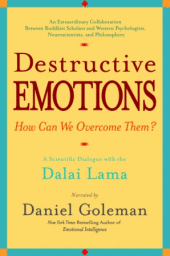In the wake of the U.S. Senate Report on Torture (Dec 9, 2014, chair Dianne Feinstein), I am reminded of the good work being done to understand and address violence in human behaviour. One powerful example, on-going meetings:
Book Review: Destructive Emotions
By Elizabeth Cushing Payne | March 1, 2004 | 0 Comments
by Daniel Goleman
Bantam Books, 2003, 432 pages
“Buddhism and science are not conflicting perspectives on the world, but rather differing approaches to the same end: seeking the truth.” It was on this premise of his that the Dalai Lama invited 12 renowned scientists and philosophers to Dharamasala, India for a five-day conference in March, 2000—the eighth meeting of its kind since 1987. Their conversations spanned the neuroscience of emotions, the nature of consciousness, and some of the latest scientific findings on how to master negative emotions and encourage compassion.
In Destructive Emotions, Daniel Goleman, the author of Emotional Intelligence and coordinator of the Dharamasala meeting, chronicles these occasionally technical and esoteric discussions with clarity and humor. From Goleman’s eloquent summary emerge several intriguing glimpses into how humans might improve their emotional balance. In one session, Richard Davidson, a psychologist at the University of Wisconsin, Madison, presents startling research about how the brain acts before, during, and after emotional states. His research has indicated that certain environments and repeated emotional experiences can actually physically alter the brain. Furthermore, he has found distinct connections between cognitive and emotional processes in the same areas of the brain—a neurological link between what we think and what we feel. His hypothesis: humans can use reason and intellect to improve their emotional balance, permanently changing the way their brain functions in the process.

Davidson’s conversation with the Dalai Lama resonated in the presentation by Mark Greenberg, who has extensive experience teaching emotional skills to children. Greenberg, director of the Prevention Research Center for the Promotion of Human Development at Pennsylvania State University, describes his emotional education curriculum, called PATHS (Promoting Alternative Thinking Strategies). Children in the program learn to understand and manage their emotions better by calming themselves, discussing their feelings, and anticipating and preparing for emotional experiences. The program’s results are extremely encouraging. Greenberg feels strongly that evaluations of PATHS show it is “laying down pathways in the brain” that create critical emotional habits just at that moment in development when children are most open to learning about their own emotional life.
Perhaps the most enlightening implication of Destructive Emotions is that rigorous scientific study of emotions, positive and negative, is making exciting progress. These scholars, with the Dalai Lama’s participation and support, are continuing to discover more about how we experience and can alter our emotional responses—all in an effort to foster global peace and well-being.